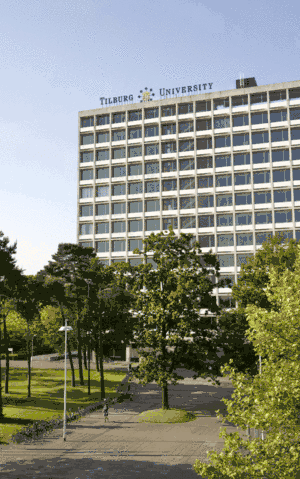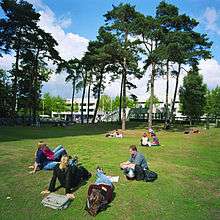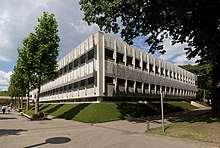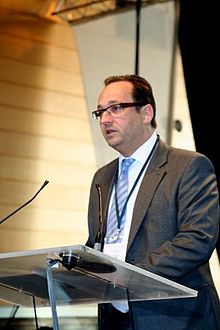Tilburg University
Tilburg University is a public research university specializing in the social and behavioral sciences, economics, law, business sciences, theology and humanities, located in Tilburg in the southern part of the Netherlands.
 | |
Motto in English | Understanding Society |
|---|---|
| Type | Public |
| Established | 1927 |
| Affiliation | Roman Catholic |
| Rector Magnificus | Professor dr. Klaas Sijtsma |
Administrative staff | 1,896 fte (2018/19) |
| Students | 15,761 (2018/19)[1] |
| Address | Warandelaan 2, Tilburg , , |
| Campus | Urban |
| School newspaper | Univers |
| Colours | Blue and Bronze[2] |
| Affiliations | EUA / AACSB / VSNU |
| Website | www.tilburguniversity.edu |
 | |
Tilburg University has a student population of about 15,700 students, about 15 percent of whom are international students. This percentage has steadily increased over the past years. Tilburg University offers both Dutch-and English-taught programs. In 2018, 45 of the total 70 (22 bachelor and 48 master programs) were English-taught. Tilburg University awards approximately 130 PhDs per year.[3]
The institution has gained a reputation in both research and education. In the field of economics, RePEc in March 2020 ranked the Faculty of Economics and Business Administration as the 23rd most productive research department in the world, and the 6th in Europe.[4] According to the 2019 Shanghai Ranking, Tilburg University is ranked 5th in the field of Business Administration and 12th in the field of Finance worldwide.[5][6] In the field of Law, Tilburg University was ranked #1 in the Netherlands for the last three years according to Elsevier Magazine.[7] Furthermore, the School of Social and Behavioral Sciences offers a unique two-year master program in Medical Psychology (in Dutch), in which students are trained as scientist practitioners in the medical setting.
History
Tilburg University was founded in 1927, as the Roomsch Katholieke Handelshoogeschool (Roman Catholic University of Commerce), being located in the southern, Catholic part of The Netherlands, visible in its second change of name in 1938: Katholieke Economische Hogeschool (Catholic Economic University). In 1963 the university was once again renamed, as Katholieke Hogeschool Tilburg (Catholic University Tilburg), followed by a name change to Katholieke Universiteit Brabant (Catholic University Brabant). Although in its present name Tilburg University, the word Catholic was dropped, the university is still regarded as a Catholic university.
1969 Protests
On April 28, 1969, students barricaded the campus buildings, demanding educational and organizational changes. Months before students had unofficially renamed the university Karl Marx University, painting this title across campus to accentuate the importance of Marxist ideas in the then primarily economics-oriented curriculum. These protests led to a widespread change in higher education across the Netherlands that was made official by the 1971 bill of Educational Reform, granting more joint decision making to students of Dutch universities.
Rankings
| University rankings | |
|---|---|
| Global – Overall | |
| ARWU World[8] | 501-600 (2019) |
| THE World[9] | 201–250 (2020) |
| USNWR Global[10] | 472 (2020) |
| QS World[11] | 371 (2020) |
Tilburg University is a specialized university and has a strong focus on Social Sciences and Economics. In 2020 three major university rankings - QS World University Ranking, THE World University Rankings and US News Best Global Universities listed Tilburg among the top 40 in the world and top 10 in Europe for Economics.[12][13][14]
In 2020, Tilburg University was ranked 17th worldwide and 4th in Europe in Economics & Business field, by the US News 2020 ranking.[15] Times Higher Education in 2019 ranked it 28th in Economics & Business and 52nd in Law globally.[16][17] The Shanghai Ranking lists Tilburg as the 5th best university in Business Administration in the world, 12th in Finance and 27th in Management.[18][19][20]
Education
The Tilburg School of Economics and Management (founded in 1927) is the oldest and largest faculty of the university. The other four faculties—Law (1963), Social and Behavioural Sciences (1963), Philosophy and Theology (1967), Arts (1981)—were founded more recently. In addition to these faculties, Tilburg University has a number of research centers and graduate schools (see below).
Undergraduate programs

Tilburg University offers a wide range of undergraduate studies, some of which are English-taught.
Tilburg School of Economics and Management
- International Business Administration
- Business Economics
- Economics
- Econometrics and Operations Research
- Fiscal Economics
Tilburg Law School
- Administrative Law and Public Administration
- Dutch Law
- Tax law
- Global Law LLB
- Public Governance
School of Social and Behavioral Sciences
- Human Resources Studies
- Organisation Studies
- Psychology (medical psychology, neuropsychology, pediatric psychology, clinical psychology, social psychology, cultural psychology)
- Global Management of Social Issues
- Sociology
School of Humanities and Digital Sciences
- Communication and Information Sciences
- Online Culture (General Culture Studies)
- Online Culture: Art, Media and Society
- Philosophy
- Cognitive Science and Artificial Intelligence
School of Theology
- Catholic Theology (in cooperation with Utrecht University)
University College Tilburg
- Liberal Arts & Sciences
Joint Bachelor Data Science (in cooperation with Eindhoven University of Technology)
Research
Research centres and institutes
- Babylon – Centre for Studies of the Multicultural Society
- CentER – Center for Economic Research
- CentER Applied Research
- CentERdata
- Center for Innovation Research
- Centre for Intercultural Ethics
- Centre for Religious Communication
- Center for Language Studies
- CoRPS – Center of Research on Psychology in Somatic diseases
- Centrum voor Maatschappelijk Ondernemen
- FIT – Tilburg Institute of Fiscal Law
- Globus – Institute for Globalization and Sustainable Development
- Infolab – Research group on Information and Communication Technology
- INTERVICT – International Victimology Institute Tilburg
- IVA – Tilburg Institute for Social Policy Research and Consultancy
- IVO – Development Research Institute
- Liturgical Institute
- Center for Meta-Research
- Netspar – Network for Studies on Pensions, Aging and Retirement
- Nexus Institute
- Oldendorff Research Institute and Graduate School – Social and Behavioural Sciences
- OSA – Institute for Labour Studies
- TCE – Tilburg Center of Entrepreneurship
- Tilburg Graduate Law school (formerly Schoordijk Institute) – Institute of Jurisprudence and Comparative Law
- Telos
- Brabant Institute for Sustainability Issues
- TIBER – Tilburg Institute for Behavioral Economics Research
- Ticer – Tilburg Innovation Centre for Electronic Resources
- TiCC – Tilburg Centre for Cognition and Communication
- TICOM – Tilburg Institute of Comparative and Transnational Law
- Tilburg Center of Finance
- TISCO – Tilburg Institute for Interdisciplinary Studies of Civil Law and Conflict Resolution Systems
- TILT – Tilburg Institute for Law, Technology, and Society
- TILEC –Tilburg Law and Economics Centre
- TiLPS – Tilburg Center for Logic and Philosophy of Science
- Tisser – Tilburg Institute for Social and Socio-Economic Research
Research and graduate schools
- CentER Graduate School (Economics and Business Administration)
- Research school for legislative studies (Law)
Notable alumni and faculty members
- Wim de Bie – writer, satirist, comedian
- Lans Bovenberg – economist
- Wim van de Donk – politician
- Afshin Ellian – professor of law, philosopher, poet, critic of Islam
- Max Euwe – chess Grandmaster, mathematician, former President of FIDE
- Jackie Groenen - Dutch footballer
- Ernst Hirsch Ballin – former Dutch Minister of Justice
- Geert Hofstede – social psychologist, anthropologist (see Hofstede's cultural dimensions theory)
- Servais Knaven – cyclist
- Ruud Lubbers – former Prime Minister of the Netherlands, United Nations High Commissioner for Refugees (2001–2005)
- Paul Scheffer
- Norbert Schmelzer – former Dutch Minister of Foreign Affairs
- Diederik Stapel – founder of the Tilburg Institute for Behavioral Economics Research, later dismissed for fabricating data.
- Max van der Stoel – politician, first High Commissioner of Organization for Security and Co-operation in Europe
- Cees Veerman – former Dutch Minister of Agriculture
- Jan Vranken - Professor of law
- Herman Wijffels – economist and politician
- In 2002, Tilburg University awarded honorary doctorates to Kofi Annan and Prof. Ariel Rubinstein in the presence of Queen Beatrix and Crown Prince Willem-Alexander.
- Willem Witteveen – legal scholar, politician, and author
- Joseph A. McCahery – corporate lawyers, researcher and institutional adviser
- Ralph Hamers – Dutch businessman, the chief executive officer (CEO) of ING Group since October 2013
- Jacques van den Broek - CEO of Randstad Holding since March 2014
References
- "Tilburg University Jaarverslag 2018" (PDF). Tilburg University (in Dutch). May 2019. p. 15. Retrieved 1 March 2020.
- Tilburg University 2011: Richtlijnen visuele identiteit – website of Tilburg University
- "Facts and Figures" (PDF). Retrieved 13 April 2020.
- "Economics rankings: Economics Departments - IDEAS/RePEc". ideas.repec.org. Retrieved 12 April 2020.
- "ShanghaiRanking's Global Ranking of Academic Subjects 2019 - Business Administration". Retrieved 12 April 2020.
- "ShanghaiRanking's Global Ranking of Academic Subjects 2019 - Finance". Retrieved 12 April 2020.
- "Tilburg University – Searchresults". Retrieved 31 May 2015.
- "Academic Ranking of World Universities 2019". Shanghai Ranking. Retrieved 17 August 2019.
- "World University Rankings 2020 - Tilburg University". Times Higher Education. Retrieved 18 September 2019.
- "Best Global Universities 2020". U.S. News Education (USNWR). Retrieved 21 November 2019.
- "QS World University Rankings 2020". Top Universities. Retrieved 15 July 2019.
- "The US News 2020 ranking in Economics & Business". Retrieved 12 April 2020.
- "QS World Economics & Econometrics Subject Ranking".
- "World University Rankings 2019 by subject: business and economics". Retrieved 12 April 2020.
- "The US News 2020 ranking in Economics & Business".
- "World University Rankings 2019 by subject: business and economics".
- "World University Rankings 2020 by subject: law". Times Higher Education. 12 April 2020.
- "Shanghai Ranking's Global Ranking of Academic Subjects 2019 - Business Administration - Shanghai Ranking - 2019". Shanghai Ranking.
- "Shanghai Ranking's Global Ranking of Academic Subjects 2019 - Finance - Shanghai Ranking - 2019". Shanghai Ranking. Retrieved 13 April 2020.
- "ShanghaiRanking's Global Ranking of Academic Subjects 2019 - Management - Shanghai Ranking - 2019". Shanghai Ranking. Retrieved 13 April 2020.
External links
![]()



.jpg)
.jpg)



.jpg)


.jpg)
_cropped.jpg)

.jpg)
.jpg)
